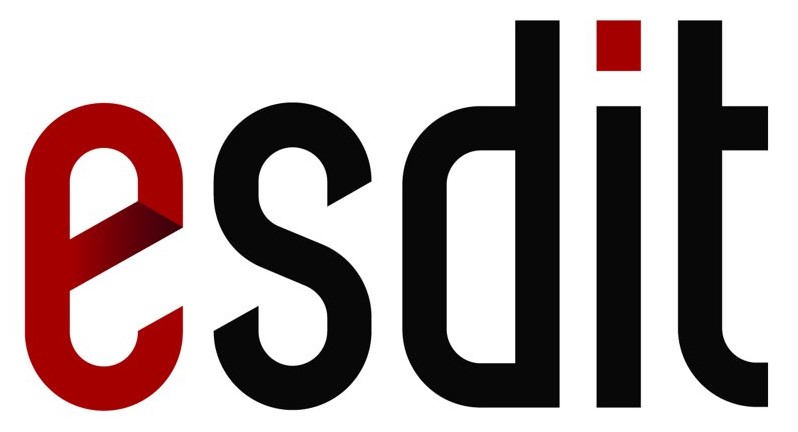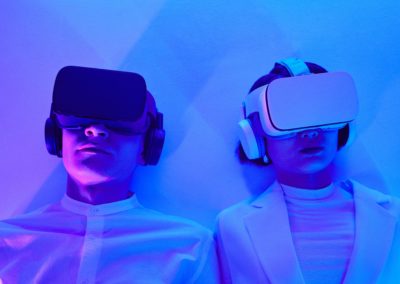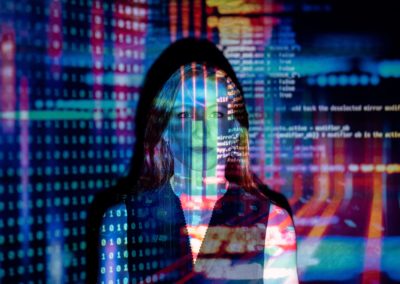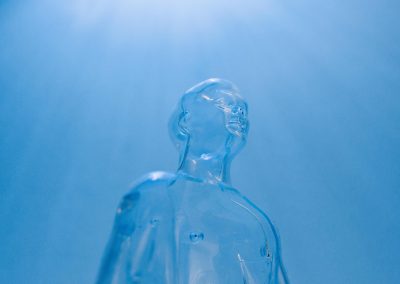ESDiT Funded Funded Projects
listed per ESDIT research line
Art for Climate Solidarity [2022-2025]
Post-doc: Dr. Aafke Fraaije (a.fraaije@tudelft.nl)
Daily supervisor: Prof. Dr. Sabine Roeser (s.roeser@tudelft.nl)
Co-supervisor: Dr. Julia Hermann (j.s.hermann@utwente.nl)
Project Description
This project will study how artworks can contribute to fostering empathy, care, and solidarity in times of climate crisis.
The idea to be investigated in this postdoc-project is how artworks can contribute to emotional-moral deliberation on climate change, by invoking compassion, sympathy and care, by making crucial contributions to solidarity, and by making the intangible but urgent challenges of climate change more concrete.
Disrupted Ageing: Personhood, Meaning, and Vulnerability across the Lifespan [2024-2028]
PhD candidate: Emma Kopeinigg (e.kopeinigg@uu.nl)
Supervisors: Dr. Christopher Wareham (c.s.wareham@uu.nl), Prof. Dr. Marcel Verweij (m.f.verweij@uu.nl), Dr. Naomi Jacobs (n.jacobs@utwente.nl)
Promoter: Prof. Dr. Marcel Verweij (m.f.verweij@uu.nl)
Project Description
This project explores the normative significance of ageing and its role in the good life. While ageing is often framed in terms of decline, loss, and perhaps even threat to wellbeing and meaningful living, many non-western traditions regard ageing as an essential process with respect to fostering wisdom, moral development, and flourishing. In this context, this project seeks to investigate what it means for ageing to be disrupted by emerging technologies, specifically with respect to foundational moral concepts that are at stake—such as personhood, meaning, and vulnerability. Drawing on inter-canonical and intercultural perspectives, including relational accounts of personhood, East Asian ethics, and lifespan-relative accounts of flourishing, this project aims to furthermore reconceptualize ageing as a significant and valuable part of the good life and integral to the human condition.
Beyond Individualism: Reconceptualizing Rights, Duties, and Well-Being [2024-2028]
PhD candidate: Benjamin Jabold (b.jabold@utwente.nl)
Supervisors: Dr. Dominic Lenzi (d.s.lenzi@utwente.nl), Dr. James Hutton (j.hutton@tudelft.nl)
Promoter: Prof. Dr. Philip Brey (p.a.e.brey@utwente.nl)
Project Description
Recent work in philosophy and critical social sciences (e.g., Flanagan 2016) highlights a deep-rooted emphasis on individualist moral values and conceptions of human wellbeing within Western cultures. These values, supported by a range of technologies improving personal choice, are increasingly under scrutiny in the face of the grand challenges of climate change, biodiversity loss, and AI-induced social disruption. In light of these challenges, the pursuit of unbridled material accumulation in the service of maximizing individuals’ preference-satisfaction and/or hedonic wellbeing looks increasingly questionable. In the fields of political economy and political ecology, technology-induced conceptual changes which go beyond the individualist paradigm are well underway. New concepts such as “degrowth” (Hickel 2020; D’Alisa, Demaria and Kallis 2015) and “post-consumerism” (Cohen, Stejnwald Brown and Vergragt 2017) have been developed to meet the environmental challenges caused by industrial technologies and the possibility of an automated world without work. Pluralistic conceptions of environmental values have also been proposed, drawing upon Indigenous traditions (Escobar 2020) and relational practices of care for nature. These conceptual innovations open a path beyond the liberal consumerist ethos which is threatened by the ecological and technological challenges of our time (and which, arguably, contributed to the emergence of those challenges). As such, there is societal pressure to revise a wide range of normative concepts bound up with Western individualism, and to examine how technologies can support or undermine such conceptual change.
Reconceptualizing Solidarity for Technologically Disrupted Contexts [2024-2028]
PhD candidate: Aliah Yacoub (a.mohamedtohamiyacoub@uu.nl)
Supervisors: Dr. Juri Viehoff (j.viehoff@uu.nl), Prof. Dr. Marcel Verweij (m.f.verweij@uu.nl)
Promoter: Prof. Dr. Marcel Verweij (m.f.verweij@uu.nl)
Project Description
This PhD project entails reconceptualizing solidarity in a way that could better fit or withstand challenges due to 21st century socially disruptive technologies. It explores the transformative interplay between disruptive technologies – particularly artificial intelligence – and solidarity. The main research method is comparative philosophical analysis, and it will employ phenomenological and feminist theories to highlight marginalized perspectives and explore the multifaceted impact of technology on solidarity: as a tool for fostering it, as a mechanism for its manipulation or suppression, and as an instrument of its conceptual disruption or extension. Pertinent to this philosophical inquiry are case studies from the Global South and other technologically-disrupted, socio-political contexts.
Technological Disruptions of Moral Concepts [2023-2027]
PhD candidate: Robin Hillenbrink (r.hillenbrink@utwente.nl)
Daily supervisor: Dr. Jeroen Hopster (j.k.g.hopster@uu.nl)
Supervisor: Prof. Dr. Philip Brey (p.a.e.brey@utwente.nl)
Project Description
The aim of this project is to develop a theoretical framework concerning the role of technology in the disruption of moral concepts, and to clarify the relation between conceptual, social, and moral disruption. The theory is to be validated and further developed by applying it to a set of moral concepts - which is to be determined. The theoretical framework should draw from theories of the relation between technology and society, as found in philosophy of technology, science and technology studies and related fields, and from theories of conceptual disruption and conceptual change, as developed amongst others in the ESDiT project in previous research. Furthermore, the project should connect studies of conceptual disruption with ethical theory. It should clarify how ethical studies of conceptual disruption relate to existing approaches in applied ethics, and to what extent they challenge or expand on these approaches.
The key research question for the project is: “How do socially disruptive technologies (SDTs) challenge and change moral concepts?”
Conceptual engineering in the philosophy of technology [2022-2026]
PhD candidate: Samuela Marchiori (s.marchiori@tudelft.nl)
Daily supervisor: Dr. Michael Klenk (m.b.o.t.klenk@tudelft.nl)
Supervisor: Prof. Dr. Ibo van de Poel (i.r.vandepoel@tudelft.nl)
Project Description
Socially disruptive technologies (SDTs) affect our lives well beyond the confines of the technological domain. Among the many areas impacted by SDTs is the conceptual domain, where they may lead to instances of conceptual disruption. That is, SDTs are believed to challenge some of our concepts and, in certain instances, cause them to no longer apply. This calls for an assessment of such concepts to determine when and how they should be changed or adapted. Conceptual engineering, the practice of evaluating, designing, and implementing concepts, seems to be a good candidate to carry out such a task. This PhD project will develop criteria for guiding conceptual engineering projects in the philosophy of technology.
This project will contribute to three central goals of ESDiT, and of the F&S line in particular. First, it will contribute to the Conceptual Change & Disruption line, and provide essential input for others in the programme who want to argue that a particular concept ought to be changed in response to a particular SDT. Second, the project will connect theoretical and practical philosophy with debates in the ethics of technology, with a particular focus on the development of new methods in the ethics of technology to address challenges raised by SDTs. Finally, the project will provide a systematic approach to evaluating the conceptual impact of SDTs.
Philosophical analysis of socially disruptive technologies and their role in transforming society [2020-2022]
Post-doc: Dr. Jeroen Hopster (j.k.g.hopster@uu.nl)
Daily supervisor: Prof. Dr. Philip Brey (p.a.e.brey@utwente.nl)
Project Description
This postdoc project analysed the general nature of socially disruptive technologies, the notions of social disruption and social transformation, and types (disruptive/transformative) impacts of technology on society, including impacts on institutions, social structures, cultural and epistemic practices, concepts, values and beliefs. Special attention has been given to theorizing the role of technology in ‘moral disruptions’ and ‘moral revolutions’, among others in relation to conceptual change. Also, the project has yielded a preliminary investigation of whether “socially disruptive technologies” constitute a sufficiently unified class to warrant a distinct ethical approach (an “ethics of socially disruptive technologies”), and how such an approach can be conceptualized.
Socially Disruptive Technologies and Conceptual Change [2020-2023]
Post-doc: Dr. Guido Löhr (g.lohr@tue.nl)
Daily supervisor: Prof. Dr. Vincent Müller (v.c.muller@tue.nl)
Project Description
The aim of this project is to understand the nature of conceptual disruption and conceptual change in the context of socially disruptive technologies. Concepts may change over time in several relevant respects. These include the meaning or intension, the scope or extension, and the preciseness or fuzziness. Conceptual change may be driven by internal developments in a scientific discipline, but also by external developments in society, such as technological developments or by normative developments. In this project we aim to answer a number of questions: What is the difference between conceptual disruptions and conceptual changes. How does a conceptual change or disruption exactly work and how can it be driven or caused by technological change? How can and should we adapt to conceptual disruptions and changes? Can conceptual engineering help us to overcome conceptual disruptions? Finally, what is the relation between conceptual change and moral change and what is the role of technology to promote moral progress?
Social and ethical dimensions of content generation technologies [2023-2027]
PhD candidate: Kaush Kalidindi (k.v.kalidindi@tue.nl)
Daily supervisor: Dr. Patrik Hummel (p.a.hummel@tue.nl) and Dr. Emily Sullivan (e.e.sullivan@uu.nl)
Supervisor: Dr. Philip Nickel (p.j.nickel@tue.nl)
Project Description
Technologies have historically changed how we conceptualized the interlocking concepts of originality and creativity and of authorship and ownership. For example, in the oral tradition it was the person telling the story that mattered, not so much the story itself. With the invention of the printing press, stories became artifacts that are trademarked, owned, and sold. Such concepts were again disrupted by technologies like genetically modified food and practices like music sampling and peer-to-peer network sharing.
Today content generation technologies (CGT) are further upending concepts of originality - creativity and authorship - ownership. AI driven GPT-3 can create text and formulate arguments. Generative Adversarial Networks (GANs), such as DALL-E 2, can produce realistic artworks in the style of particular artists. Next to conceptual disruptions, CGT also raise many ethical issues surrounding ownership of intellectual property, trustworthiness and overreliance, and reproduction of human biases in GPT-3 generated texts.
This PhD project takes a critical look at the way CGTs affect the interrelated concepts of originality and creativity on the one hand, and authorship and ownership on the other, and explore the ethical implications of CGT and AI-supported acts of creativity and authorship.
Towards a Just Implementation of Carbon Dioxide Removal: A Capabilities Approach [2021-2025]
PhD candidate: Elisa Paiusco (e.paiusco@utwente.nl)
Daily supervisor: Dr. Dominic Lenzi (d.s.lenzi@utwente.nl)
Supervisor: Prof. Dr. Philip Brey (p.a.e.brey@utwente.nl)
Project Description
Responding to climate change will very likely require a large-scale effort to remove carbon dioxide from the atmosphere through carbon dioxide removal techniques (CDR). Some of these technologies remain relatively uncontroversial, but many generate difficult tradeoffs or significant ethical concerns. And while many of these concerns have been the subject of rigorous study, questions of intergenerational justice in the context of carbon removal are relatively under-theorized.
By focusing on the capabilities of present and future generations, this project proposes to provide ethical insight into mitigation discussions involving the deployment of CDR in the context of mitigation pathways compatible with sustainable development. This project aims to develop a unique, action-guiding account of intergenerational justice that can be applied to the specific intergenerational issues and assumptions of CDR.
In keeping with the goals of the Ethics of Socially Disruptive Technologies program, this project will also explore the extent to which the specific issues raised by intergenerational justice in climate policy will lead us to revise or create new theoretical understandings of core normative concepts and commitments. To what extent to does adopting an intergenerational perspective require a revision of important distinctions or theories in political philosophy? Similarly, the project will also explore the extent to which our ethical and political concepts may need to be revised in to make them more readily translatable into public policy.
Electoral Technologies and democracy in global perspective [2021-2025]
PhD candidate: Arthur Gwagwa (e.a.gwagwa@uu.nl)
Daily supervisor: Dr. Dorothea Gädeke (d.g.gadeke@uu.nl)
Co-supervisor: Prof. Dr. Joel Anderson
Project Description
Genuine democracy presupposes well-founded trust in the electoral process, regarding electoral procedures and the formation of electoral choice. It requires securing the secrecy as well as the transparency of the vote. Traditionally, the democratic credentials of elections are based on physical arrangements regarding electoral procedures (printed ballots, isolated voting booths) and the formation of electoral choice (via public information and journalism).
However, these arrangements (and their normative legitimation) are being disrupted by the spread of new electoral technologies, especially in new democracies of the Global South. Paper-based election systems have increasingly been supplanted by electronic election systems (e.g. biometric voter identification, ballot scanners, internet voting). And as political campaigns have become increasingly complex, datafied, and sophisticated, new technological coping strategies have emerged in response (e.g. voting advice applications, fake-news detectors, and filtered or bubble-bursting news feeds).
Despite potential gains in efficiency, reliability, and convenience, such technologies raise concerns about the inclusivity, reliability, manipulability, and verifiability of these electoral technologies. In light of these concerns, the project seeks to investigate to what extent new electoral technologies necessitate rethinking normative assumptions about the legitimate basis for confidence in electoral outcomes and trust in democratic institutions, particularly in light of two (potentially) disruptive effects of these technologies. On the one hand, they challenge received normative criteria for democratic credibility by introducing new options and difficulties regarding how to realize (1) secrecy/anonymity, (2) transparency/accountability, and (3) the appropriate balance between (1) and (2). On the other hand, they are being implemented in contexts of power and domination, both domestically and transnationally, that may be transformed or further entrenched as a consequence of their implementation. This, in turn, requires rethinking related concepts social unity, political agency, self-determination, freedom as non-domination, capabilities. Particular emphasis will be placed on the context of power in which such technologies are promoted in the Global South.
Will democracy survive social media? [2020-2024]
PhD candidate: Roxanne van der Puil (r.e.v.d.puil@tue.nl)
Daily supervisor: Prof. Dr. Lambèr Royakkers (l.m.m.royakkers@tue.nl)
Co-supervisors: Dr. Andreas Spahn (a.spahn@tue.nl) and Dr. Uwe Matzat (u.matzat@tue.nl)
Project Description
Social media has become an essential space of public and semi-public discourse, and has the potential for a second wave of digital democracy by increasing access to information and greatly lowering the barrier of participation in public debates. The last few years, however, have also shown risks that are present in social media. Fake news, disinformation, manipulation and disguised propaganda in social media have contributed to a post-truth era in which objective facts are less influential in shaping public opinion than appeals to emotion and personal belief.
In this project we will investigate the complex picture of the influence of social media upon democratic politics, and whether the claim that democratic practices is linked to truth telling, rationality, consensus and reason is still tenable due to social media. We do so by empirically and conceptually investigating the rise of post-truth and critically examining the role of feelings in online discourse.
The objective of this project is to develop a normative and empirical model of democracy theory that takes into account the potential of social media to facilitate more participative democracy while acknowledge its disruptive value of challenging traditional democratic norms and practices.
Brain-computer interfaces & the disruption of the concept of personhood [2022-2026]
PhD candidate: Bouke van Balen (b.j.v.balen@tue.nl)
Daily supervisors: Dr. Janna van Grunsven (j.b.vangrunsven@tudelft.nl) and Dr. Mariska Vansteensel (m.j.vansteensel@umcutrecht.nl)
Co-supervisors: Prof. Dr. Wijnand Ijsselsteijn (w.a.ijsselsteijn@tue.nl) and Prof. Dr. Nick Ramsey (n.ramsey@umcutrecht.nl)
Project Description
In light of thorny ontological and ethical issues, the aim of this project is to answer the following research question: how do BCIs disrupt assumptions about where and how we can (or even should) demarcate something as ontologically and ethically significant as personhood? As a secondary objective, the project will contribute to new interdisciplinary approaches and methods at the intersection of STEM disciplines and ethics/philosophy. Moreover, insights gained from the project are likely to ethically inform the ongoing design of current and future BCI technologies.
This PhD position represents a unique interdisciplinary collaboration between medical neuro-technologies and psychology of human-technology interactions. The innovative potential of this research project is enormous, since the PhD candidate is embedded within the research group at UMC Utrecht, working directly with those responsible for developing a world-wide first, fully implanted BCI for home use.
Philosophical anthropology research [2022-2025]
Post-doc: Dr. Anna Puzio (a.s.puzio@utwente.nl)
Daily supervisor: Dr. Julia Hermann (j.s.hermann@utwente.nl)
Co-supervisor: Prof. Dr. Joel Anderson (j.h.anderson@uu.nl)
Project Description
This project will study how new and emerging technologies – biotechnologies, digital technologies, robots, and/or climate technologies – have implications for our ontological and ethical understanding of the human being. The project deals with the question of how the understanding of the human being changes in the context of new technologies. Therefore, the project is dedicated to philosophical anthropology against the backdrop of technological advancements, which can be referred to as anthropology of technology. A particular focus is placed on a relational approach and the inclusion of nonhuman entities such as animals and technology, thereby connecting ethics of technology and environmental ethics. Emphasis is also placed on diversity, such as gender and intercultural approaches, within the field of anthropology.
Emerging technologies and the moral character of the human being [2021-2025]
PhD candidate: Kristy Claassen (k.claassen@utwente.nl)
Daily supervisor: Dr. Julia Hermann (j.s.hermann@utwente.nl)
Supervisors: Prof. Dr. Ciano Aydin (c.aydin@utwente.nl), Prof. Dr. Wijnand IJsselsteijn (w.a.ijsselsteijn@tue.nl) and Prof. Dr. Peter-Paul Verbeek (p.p.c.c.verbeek@uva.nl)
Project Description
A defining characteristic of the African Philosophy of Ubuntu is that we become human through others. As the proverb goes, ‘I am, because we are’ (Mbiti 1990). How, then, do technologies that claim to be socially disruptive fit into this moral framework? The aim of this project is to investigate how the moral character of the human being is affected by emerging technology within the ontological (Ramose 1999) and ethical (Metz 2007) framework of Ubuntu. The secondary aim is to explore the way in which human-technology relations are redefined within Ubuntu parameters. Concepts central in Ubuntu, such as autonomy, agency, responsibility and being (socially) human are being reconfigured through the emerging technology of AI. As this technology is poised to play an increasingly important role in the African context, the task of understanding how human moral character is shaped by it becomes urgent. At its core Ubuntu is a way of being that emphasises becoming human through values such as compassion, connectedness and inclusivity. The proposed research will focus not only on how these values are reconfigured in relation to technology but also how these values could shape the way in which AI is developed and employed in society. The Ubuntu framework for being (socially) human could undoubtedly inform a more humane approach to emerging technologies.
The Ethics of Humanoid Robots [2021-2025]
PhD candidate: Cindy Friedman (c.friedman@uu.nl)
Daily supervisors: Prof. Dr. Sven Nyholm (sven.nyholm@lrz.uni-muenchen.de) and Dr. Lucie White (l.a.white@uu.nl)
Co-supervisors: Prof. Dr. Ingrid Robeyns (I.A.M.Robeyns@uu.nl) and Dr. Lily Frank (L.E.Frank@tue.nl)
Project Description
Robots that look and act like humans are currently being created for a variety of purposes: care robots for children with autism and as companions for the elderly; so called sex robots; display model show robots like “Sophia” (who was awarded honorary citizenship in Saudi Arabia), and so on. Meanwhile, AI systems are also increasingly making decisions previously made by humans: for example, expert systems advise doctors about the resuscitation of coma patients, and autonomous vehicles make decisions about life and death. Soon these trends may converge, and we may start seeing humanoid robots with humanlike AI. The prospect of humanlike qualities in robots and AI is a both deeply fascinating and controversial prospect. It has the potential to create social and moral confusion and disruption. The aim of this PhD project is to investigate the ethics of “humanlikeness” in robots and AI, with a special focus on how this might (re)shape our ideas of our own humanity and especially the moral status of our own humanity. If some robots start looking and acting like humans and some AI systems take on humanlike roles, what does this mean for the moral importance of humanity as an end in itself (as in, e.g. Kantian ethics, but also in ethical thinking in general)? What might it mean for who we regard as agents and patients in the moral domain? If looking and acting like a human being is no longer reserved for human beings alone, but also something we start associating with robots and AI, should this make us reassess the ethical uniqueness that we commonly associate with being human?
Behaviour change technologies for moral improvement [2021-2023]
Post-doc: Dr. Matthew Dennis (m.j.dennis@tue.nl)
Daily supervisor: Dr. Lily Frank (l.e.frank@tue.nl)
Supervisor: Prof. Dr. Wijnand IJsselsteijn (w.a.ijsselsteijn@tue.nl)
Project Description
This project aims to explore the morally disruptive potential of behavior change technologies for moral behaviour that is, technologies that can be used to improve moral cognition or moral decision making. They include bio or neuro-enhancement, robotic nudges, nudge-designed environments, and ambient persuasive technologies, which may help people behave more consistently with their deeply held moral convictions or aid people in overcoming cognitive and affective limitations that prevent them from appreciating a situation’s moral dimensions, or they may simply make it easier for them to make the morally right choice by helping them to overcome sources of weakness of will. This project will focus, first, on the possibility that use of such technology will lead to moral deskilling or atrophy of moral “muscle”. It will investigate whether or not, and in what ways, such deskilling is problematic from a moral point of view.
Answering these questions can allow us to rethink fundamental ethical debates on for example, the value of moral action itself; the relative importance of consequences and intentions; and the nature of character. Secondly, it will investigate how moral technologies mediate or lessen our experience of moral distress, conflict, and struggle. If moral struggle is offloaded to a system of technological nudges, persuasions, and e-choice architecture, does this undermine or shift the meaningfulness of engaging with and potentially overcoming moral challenges? How might this change impact individual levels of well-being and self-assessments of control, character, and authenticity?
The techno politics of the climate movement [2020-2024]
PhD candidate: Patricia Reyes Benavides (p.d.reyes@utwente.nl)
Daily supervisor: Dr. Nolen Gertz (n.gertz@utwente.nl)
Co-supervisors: Prof. Dr. Peter-Paul Verbeek (p.p.c.c.verbeek@uva.nl) and Prof. Dr. Ingrid Robeyns (i.a.m.robeyns@uu.nl)
Project Description
My research analyses the use and appropriation of Internet platforms by environmental activists. By bridging philosophy of technology to political theories, I draw connections between Internet-enabled Climate Activism Networks (e.g. Extinction Rebellion, Fridays for Future, Futuros Indígenas) to new technopolitical regimes. With this approach, I aim to show the political significance of technologies in the evolution of social and ecological movements.
Within the ESDiT consortium, I contribute to the research lines of 'The Future of a Free and Fair Society' and 'The Human Condition. I am also an active member of the Intercultural ethics track, which underscores the relevance of philosophical traditions outside of the Western canon to understand and address global challenges.
Ethics of Existential Risk: A Buddhist Perspective [2025-2029]
PhD candidate: Hin Sing Yuen (H.S.Yuen@tudelft.nl)
Supervisors: Dr. Gunter Bombaerts (g.bombaerts@tue.nl), Dr. Kritika Maheshwari (K.Maheshwari@tudelft.nl)
Promoter: Prof. Dr. Sabine Roeser (s.roeser@tudelft.nl)
Project Description
This research project seeks to investigate how Buddhist ethics can inform the understanding, mitigation, and management of existential risks, broadly defined as risks that threaten the extinction of humanity or destruction of our long-term potential.
Specifically, the project has three objectives:
1) To examine how Buddhist philosophy can contribute to the conceptualization of existential risk, particularly in response to the challenges posed by socially disruptive technologies.
2) To develop a Buddhist-inspired relational ethics framework that fosters an inclusive and intercultural approach to existential risk.
3) To recommend practical applications of Buddhist theories and practices in existential risk management.
Confucianism and Ethics of Technology [2021-2025]
PhD candidate: Joseph St. Maria (j.e.sta.maria@tudelft.nl)
Daily supervisor: Dr. Elena Ziliotti (e.ziliotti@tudelft.nl)
Supervisor: Prof. Dr. Sabine Roeser (s.roeser@tudelft.nl)
Project Description
This PhD will use Confucian philosophy as a conceptual resource in answering how people can flourish in a world that is being increasingly proliferated by digital technologies. It will use a Confucian-inspired framework for human flourishing drawn, from the Great Learning, (Da Xue 大學) to organize its inquiry. This framework identifies four spheres of relations that constitute a good or flourishing life. These are the spheres of the “self,” the “interpersonal,” the “political,” and the “world.” For each of these spheres, a digital technology shall be investigated. Specifically, an ethical issue about that technology will be explored. The dissertation shall then assess the issue through a Confucian lens and propose practical recommendations, with the goal of addressing the issue in a way that can improve the digital good life or well-being.
World-constituting technics: Digital technologies and the disruption of the lifeworld [2024-2028]
PhD candidate: Christa Laurens (christa.laurens@wur.nl)
Supervisors: Prof. Dr. Vincent Blok (vincent.blok@wur.nl), Dr. Bernice Bovenkerk (Bernice.bovenkerk@wur.nl), Dr. Nolen Gertz (n.gertz@utwente.nl)
Promoter: Prof. Dr. Vincent Blok (vincent.blok@wur.nl)
Project Description
Socially disruptive technologies (SDT’s) like digital technologies (for example, AI, digital twins, social media etc.) raise societal concerns, which can be observed in concerns about surveillance capitalism, instrumentalization of production and consumption, datafication of all domains of human and non-human life etc. We can frame these concerns in terms of the disruption of the lifeworld – i.e. the meaningful environment of everyday life experience in which we are at home and live and act together. The disruption of the lifeworld by digital technologies first of all suggests that there are general patterns that SDT’s like digital technologies have in common, and secondly that they not only have an impact on the users or consumers for instance, but have a broader impact on the lifeworld in which we live and act.
The first objective of this PhD project is to reflect on the general patterns emerging from 21st century SDT’s. The second objective of this PhD project is to reflect on the disruptive impact of digital technologies on the datafication and denaturalization of the lifeworld, i.e. the framing of the world in terms of datasets and algorithmic computation determines increasingly human and non-human living and acting in the world and changes for example the experience of social relations, human-animal relations, and the experience of the meaning of life. To articulate a proper concept of the disruption of the lifeworld by digital technologies, the project critically builds on contemporary debates in continental philosophy of technology and philosophy of innovation to develop a concept of world-constitutive technics.
Disrupting Finitude: Flourishing and Nature [2022-2025]
Post-doc: Dr. Lorina Buhr (l.buhr@uu.nl)
Daily supervisor: Dr. Christopher Warehem (c.s.wareham@uu.nl)
Co-supervisors: Prof. Dr. Joel Anderson (j.h.anderson@uu.nl) and Dr. Bernice Bovenkerk (bernice.bovenkerk@wur.nl)
Project Description
The aim of this postdoc project is to investigate the research question: “To what extent are disruptions of finitude detrimental to the flourishing of animals, humans, or the natural world, and how do related technologies challenge our understanding of irreversibility, finitude and flourishing?”
Recent technological developments are disrupting finitude, challenging the very idea that death is inevitable or final. Technologies that, for instance, extend lifespan or resurrect extinct species invite interrogation, and perhaps reconceptualization, of finitude and its relationship to the ethical value of flourishing for humans, animals, and the natural world.
In ethics, finitude has a complex relationship to flourishing. On the one hand, death curtails possibilities for future flourishing. On the other hand, flourishing lives for humans and non-human animals are commonly thought to have a characteristic structure, with natural cycles of birth, reproduction, and death framing the evaluation. Moreover, birth and death in nature arguably drive natural flourishing through evolution and natural selection. Technologies that disrupt finitude place a strain on these relationships and problematise the concepts of irreversibility, flourishing and the natural.
Of the technologies that challenge finitude, two categories of technology are particularly relevant: (1) life extensions, which disrupt the finitude of individuals, and (2) extinction and de-extinction technologies, which disrupt the finitude of plant and animal species or natural entities such as glaciers. The project’s focus is on technologies for de-extinction. This postdoctoral project will provide ontological, conceptual and normative analysis of them, problematising the relations between irreversibility, finitude, flourishing, and the natural world.
The social and moral complexities of water recycling [2021-2025]
PhD candidate: Karen Moesker (k.moesker@tudelft.nl)
Daily supervisor: Prof. Dr. Neelke Doorn (n.doorn@tudelft.nl)
Co-supervisors: Dr. Udo Pesch (u.pesch@tudelft.nl)
Project Description
Water is the most fundamental good for the survival of humans and any other living organism on this planet. Increasing water demand due to growing populations and climate change has put a strain on global water resources.
In response to this challenge, water recycling systems like Direct Potable Water Reuse (DPR) have emerged as a potential solution. The aim is to enhance access to safe drinking water while reducing reliance on conventional water sources and minimizing pollution and our carbon footprint. Although DPR technology is already being utilized in certain regions, it remains a subject of controversy. The reason behind this lies in its disruptive nature – DPR combines two water streams that have been strictly separated for centuries: drinking water and wastewater.
There seems to be an imbalance between the perceived goodness of the technology and its disruptive nature that generally leads to public rejection of this technology. Nevertheless, its implementation is being proposed in many arid regions, with the promise of increasing water availability and thereby improving the human right to water and sanitation, even in regions with strong public opposition.
The primary objective of this PhD dissertation is to comprehend the intricate social and moral aspects of water recycling technologies like DPR. By doing so, the aim is to gain deeper insights into how to address concerns about acceptance, acceptability, and desirability within ongoing debates surrounding the sustainable implementation of such water recycling technologies.
Philosophical and ethical implications of biomimetic technologies [2021-2025]
PhD candidate: Alessio Gerola (alessio.gerola@wur.nl)
Daily supervisor: Dr. Zoë Robaey (zoe.robaey@wur.nl)
Supervisor: Prof. Dr. Vincent Blok (vincent.blok@wur.nl)
Project Description
Designers are increasingly turning to nature in search for inspiration to design new and more sustainable technologies. Biomimetic design (from the Greek bios, life, mimesis, imitation) is the conscious imitation of biological models to solve today's technical and ecological challenges. Biomimetic technologies are typically considered more sustainable than their counterparts since they imitate the circular and multifunctional features that natural organisms and ecosystems have evolved over billions of years. Such ecological promise, however, is complicated by a variegated landscape of different disciplines (biomimicry, biomimetics, bionics, agroecology etc.) that imitate natural models and principles in different ways and for very different reasons. Motivations can range from innovative functions and improved performance to resilience and sustainability. The aim of the project is to reflect on the implicit conceptual and normative assumptions about nature, imitation, and technology that drive different biomimetic design trends. At stake are the ambiguity of biomimetic design in relation to the risk of replacing nature with an artificial copy, and its potential and limits as a paradigm for sustainable technology.
Governance of geoengineering in the face of normative uncertainties [2020-2024]
PhD candidate: Benjamin Hofbauer (b.hofbauer@tudelft.nl)
Daily supervisor: Prof. Dr. Benham Taebi (B.Taebi@tudelft.nl)
Co-supervisors: Dr. Udo Pesch and Prof. Dr. Ibo van de Poel
Project Description
Geo-engineering, more specifically Solar Radiation Management (SRM), is the deliberate manipulation of sunlight that could alleviate some of climate change concerns. This gives rise to profound and irreversible risks and engenders many uncertainties, including uncertainties in how to deal with normative quandaries when there are different partially morally defensible but incompatible options. Current concepts of risk and risk governance are insufficient in capturing the necessary ethical intricacy. We need a richer account to address the subtle yet extensive normative issues associated with risk decisions regarding SRM.
The objective of this project is to develop a fine-grained conceptualization of normative uncertainties, while identifying and developing risk governance approaches that are most suitable for dealing with these uncertainties.
Synthetic life and living technology – transcending dichotomies with synthetic biology [2020-2024]
PhD candidate: Julia Rijssenbeek (julia.rijssenbeek@wur.nl)
Daily supervisor: Dr. Zoë Robaey (zoe.robaey@wur.nl)
Supervisor: Prof. Dr. Vincent Blok (vincent.blok@wur.nl)
Project Description
Synthetic biology presents us with a pressing case to transcend traditional disciplinary boundaries and concepts. The rapidly developing field is bringing forth novel biological entities that are leaving the laboratory and entering society in a variety of applications ranging from food, drugs, materials, to fuel. Synthetic biology claims to be relevant to the grand challenge of climate change, by creating bio-based alternatives for unsustainable ways of production. Still, environmental philosophy is not so much concerned with synthetic entities and their ecological role, while philosophy of technology tends to exclude the environment from its debates. The transgressive nature of synthetic biology demands reflection from both domains.
On an ontological level, thinking about technology is often confined to an old image of machines as homogenous and repetitive automata, an image that is at the same time often guiding our thinking about life forms. Meanwhile, technological innovations are increasingly inspired by biology. The hybrid entities of synthetic biology require us to think beyond the machine paradigm and its associated traditional dichotomies between biology and technology, organisms and machines, life forms and artefacts, natural and artificial. Especially since in practice, these dichotomies are already transcended.
On an ethical level, synthetic biology invites us to reflect on the effect on values that are key to the domains it is about to disrupt, such as the values of naturalness and sustainability in agriculture. The advent of cellular agriculture can exacerbate the ecology-ecomodernism debate if these values are not reflected on in the design process. In addition, synthetic life and living technologies raise questions about the moral status of these new hybrid entities.
How AI Systems Could Be Used To Improve Ethics Methodology [2025-2029]
PhD candidate: Berker Bahceci (b.bahceci@tue.nl)
Supervisor: Dr. Elizabeth O’Neill (e.r.h.oneill@tue.nl)
Promoter: Dr. Philip Nickel (p.j.nickel@tue.nl)
Project Description
AI systems assist people with many tasks. In the last decade, it has been speculated that one such task is helping people with their moral quarrels; that AI systems can morally enhance moral agents. Relatedly, one can ask whether such systems, now or in the near-future, can ‘enhance’ moral philosophers by bettering the methods they use. Arguably, the outcomes of this endeavor, could help moral philosophers respond to challenging, contemporary ethical questions. Furthermore, the results of such an approach could trickle down to the project of daily moral enhancement; in virtue of being better equipped to respond to ethical challenges, moral philosophers can contribute in novel ways to the ethically responsible design of morally enhancing AI systems. The aim of this project is to find ways AI technologies can be used to improve ethics methodology by creating a descriptive and evaluative inventory of methods moral philosophers use, and look for plausible ways to improve them using AI. Tentatively, popular methods like Reflective Equilibrium and thought experiments can be improved; though the project is not committed from the outset to improve these methods. Whatever methods are chosen, one final aim will be to discuss whether AI-ification indeed is an improvement by critically evaluating what an improvement to moral methodology would look like.
Capabilities and Diversity in Ethics of Technology [2024-2028]
PhD candidate: Giovanni Prins (g.r.prins@utwente.nl)
Supervisors: Dr. Naomi Jacobs (n.jacobs@utwente.nl, Dr. Janna van Grunsven (j.b.vangrunsven@tudelft.nl)
Promoter: Prof. Dr. Philip Brey (p.a.e.brey@utwente.nl)
Project Description
The aim of my research project is to develop a new approach for ethically assessing the disruptive impact of technologies on individuals. The project centres on two key ideas.
The first is that the personal interests of individuals centre on not only the protection of rights, but also on support for the development of capabilities. Therefore, we need to develop an ethics of capability development in relation to technology.
The second key idea is that one should take into account human diversity in ethically assessing capabilities. Ethics too often assumes a generic individual with generic needs and capabilities as the subject of ethical analysis. Therefore, we need an ethics of diversity and technology that considers human differences, both social, psychological and physiological, and allows us to identify and analyse ethical issues in relation to different individuals and groups, rather than ‘the human being’ in general.
My objective is thus to develop a theoretical and methodological framework for ethically assessing the differential and disruptive impact of technology on individuals
Mutual Justification and Disruptive Technologies [2024-2027]
Post-doc: Dr. Giles Howdle (g.h.howdle@uu.nl)
Supervisors: Prof. Dr. Joel Anderson (j.h.anderson@uu.nl), Dr. Jeroen Hopster (j.k.g.hopster@uu.nl)
Project Description
A key part of what makes the emergence of new technologies particularly disruptive is the moral disorientation and uncertainty that they often produce. Socially disruptive technologies can challenge the applicability of established principles to changed circumstances, the foreseeability of future consequences, and even the viability of key ethical concepts, leading to uncertainty, instability, and ambiguity about ethical judgments and intuitions.
Circumstances of moral disorientation pose special difficulties for what is, arguably, a key feature of ethics: the aim of mutually justifying our judgments, policies, and actions to one another. The central aim of this project is to examine the potential for 1) approaches to normative ethics which foreground mutual justification and 2) the field of ethics of technology to learn from each other, particularly in addressing the following questions, broadly construed:
How can we best understand the obligation to mutually justify our responses to socially disruptive technologies and the moral dynamism, moral uncertainty, and moral disorientation associated with them? And, more generally, how can we come up with robust moral justifications if morality is subject to change?
Improving ethical analysis through better conceptualization of the moral role of technological products and systems [2023-2027]
PhD candidate: Haizea Escribano (h.escribanoasensio@utwente.nl)
Daily supervisor: Dr. Adam Henschke (a.henschke@utwente.nl)
Supervisor: Prof. Dr. Philip Brey (p.a.e.brey@utwente.nl)
Project Description
This project investigates how we can conceptualize the role of technological products in moral and immoral acts and events, and how this conceptualization can result in new and better approaches to ethical analysis. The focus is not just on single technological products with single users, but also on larger systems with multiple technological components and human operators. These include both sociotechnical systems – predominantly technical systems with human operators and enablers, such as an electricity networks, industrial production systems and the internet, and technosocial systems – predominantly social systems that rely on technology, such as modern organizations and associations.
The PhD candidate will investigate the different causal and moral roles that technology can take in morally consequential actions and events involving technologies with single users, autonomous technologies, and sociotechnical and technosocial systems. She will do so, initially, by studying and critiquing approaches in ethics (especially ethics of technology) that conceptualize the role of technology, and by making explicit what roles are assigned to technology. Also considered will be descriptive approaches to technology, users and society in STS, technology assessment and impact assessment and their possible translation to ethics. This is followed by the development of a new approach for ethical analysis which includes a vocabulary and methodology for understanding and assessing the various roles of various types of (socio)technological products and systems in moral actions and events. The approach will mostly be theoretical but will also involve a number of (smaller) case studies.
There will be a particular focus on socially disruptive technologies: technologies that transform everyday life, social institutions, cultural practices, and potentially even fundamental beliefs and values.
Methods of practical philosophy regarding socially disruptive technologies [2022-2025]
Post-doc: Dr. Björn Lundgren (b.a.lundgren@uu.nl)
Daily supervisor: Prof. Dr. Joel Anderson (j.h.anderson@uu.nl)
Co-supervisor: Prof. Dr. Sven Nyholm (sven.nyholm@lrz.uni-muenchen.de)
Project Description
The aim of this postdoc project is to investigate the following research question:
“Which methods in practical philosophy are best suited (and on what grounds) for (1) understanding the normative concerns that are raised by emerging technologies (particularly, their socially and conceptually disruptive character) and for (2) justifying revised philosophical approaches to those concerns?”
This project addresses a complex and multi-faceted range of issues. Some socio-technological developments may require fundamental rethinking of our normative accounts, while others can be addressed using familiar frameworks. Emerging and socially disruptive technologies may share distinctive ethical characteristics, but they may also differ fundamentally in the methods needed to analyze them. And the discussion of these issues occurs against a background of ongoing disputes about methodological pluralism and the relationship between more contextual methods and more principled methods in ethics, political philosophy, and related fields of philosophical and scientific inquiry.
How theories of technology and its relation to society can inform and transform ethics [2022-2023]
Post-doc: Dr. Kevin Scharp (k.a.scharp@utwente.nl)
Supervisor: Prof. dr. Philip Brey (p.a.e.brey@utwente.nl)
Project Description
The aim of this postdoc project is to investigate conceptual disruptions, especially those caused by socially disruptive technologies (SDTs), require responses in the form of conceptual engineering. What is conceptual engineering, what are appropriate methods, and how can conceptual disruptions caused by SDTs be responded to?
Compliance by Design: Technical Challenges of EU AI Act Requirements and Their Ethical Implications [2025-2029]
PhD candidate: Roberta Tamponi (r.tamponi@liacs.leidenuniv.nl)
Supervisors: Dr. Anna Kononova (a.kononova@liacs.leidenuniv.nl), Dr. Carina Prunkl (c.e.a.prunkl@uu.nl)
Promoter: Prof. Dr. Thomas Bäck (t.h.w.baeck@liacs.leidenuniv.nl)
Project Description
This PhD project aims to critically evaluate the European Union's Artificial Intelligence Act (AI Act) as an example of the challenges associated with promoting and monitoring compliance in AI systems, focusing on both technical feasibility and broader ethical implications. The research investigates how the ethical and legal requirements outlined in the Act can be translated into tangible technical solutions, particularly in the design, development, and assessment of algorithms and systems that embody its mandates. A central goal is to explore methodologies for assessing compliance with the Act, developing risk evaluation frameworks aligned with its classifications, and creating practical tools for ensuring AI systems adhere to ethical and technical standards. By focusing on "compliance by design," this project also seeks to identify best practices in algorithmic design that address the Act’s requirements while highlighting potential technical limitations.
In addition to its technical focus, the research addresses the intersection of ethics and technology, examining how design choices informed by the Act’s guidelines can be evaluated against broader ethical principles. The study will also extract lessons from similar attempts to integrate compliance considerations into technology design, offering generalizable insights for future regulatory approaches to emerging AI technologies. This work is part of the Ethics of Socially Disruptive Technologies (ESDiT) programme, an interdisciplinary initiative examining how emerging technologies challenge and reshape moral values and societal concepts, combining insights from ethics, philosophy, technology, and social sciences to address pressing issues at the intersection of these domains. Through its integration of ethical and technical dimensions, the project contributes to the development of robust, forward-looking approaches to AI governance.
Preserving Human Capabilities & Extending Well-Being [2025-2029]
PhD candidate: Freek van der Weij (f.h.v.d.weij@tue.nl)
Supervisors: Dr. Matthew Dennis (m.j.dennis@tue.nl), Dr. Linghan Zhang (l.zhang1@tue.nl)
Promoter: Prof. dr. Wijnand IJsselsteijn (W.A.IJsselsteijn@tue.nl)
Project Description
To preserve human capabilities as people age, governments, organizations and individuals increasingly turn to technology. Rising healthcare costs due to aging populations put pressure on this development. Often however, new technologies are not well-attuned to the needs and desires of the intended user group. This project aims to improve the consideration of first-person human experience in the design of technologies for older people.
The project contributes to the ESDiT program in two respects: (1) the project contributes to the ESDiT objective of improving the interdisciplinarity of philosophy of technology and (2) it aims to improve understanding of the technology-induced societal disruption of aging.
Qualitative investigation of STEM perspectives [2022-2023]
- Post-doc: Dr. Michael Dale (m.t.dale@tue.nl)
- Supervisor: Prof. Dr. Wijnand IJsselsteijn (w.a.ijsselsteijn@tue.nl)
Project Description
The aim of this postdoc project is to perform a multi-method empirical investigation and philosophical analysis of the ethical practices and mechanisms (e.g., safeguards, guidelines) employed by current scientific thought leaders in STEM (Science, Technology, Engineering and Mathematics) fields, CEOs, entrepreneurs and technical experts in relevant high-tech/biotech industries in order to create ethical awareness, assess ethical drivers and barriers, and raise ethical concerns. This includes the current form of ethical knowledge within high-tech environments, the role that ethical considerations play in pursuing, altering or discontinuing certain technological pursuits, and the extent to which ethical notions, considerations and practices are impacting current and future technology R&D, including the societal introduction and use of high-tech products and services. There will be a special emphasis on the extent to which currently used ethical concepts, methods and recommendations connect well with the practices in industry and policy regarding the disruptive or transformative potential and actual effects of technology.
Ethics of Data-Driven Mental Health Diagnostics [2021-2025]
PhD candidate: Anna van Oosterzee (a.m.vanoosterzee@uu.nl)
Daily supervisor: Dr. Sander Werkhoven (s.werkhoven@uu.nl)
Co-supervisor: Prof. Dr. Joel Anderson (j.h.anderson@uu.nl)
In collaboration with Leiden University, Leiden Institute of Advanced Computer Science
Dr. Anna Kononova (a.kononova@liacs.leidenuniv.nl) & Prof. Dr. Thomas Back (T.H.W.Baeck@liacs.leidenuniv.nl)
Project Description
As part of the Esdit research line on “The Human Condition,” this project addresses a complex and multi-faceted range of issues raised by recent and expected developments in machine learning and predictive data-driven analytics. Through the development of ever-more complex computational techniques to analyse large data sets, translational bioinformatics and other computational approaches increasingly enable medical researchers and clinicians to develop diagnostic approaches that are more fine-grained, personalized, and predictively accurate than those based on current categories of disease. Although “precision medicine” is relatively well established, parallel approaches in psychiatry are quite new. For the data scientists, research psychiatrists, and mental health professionals developing these approaches, these emerging technologies raise vexing ethical issues – issues that are also central to research in philosophy of psychiatry, disability studies, philosophy of science, data ethics, and philosophy of technology.
The aim of this PhD project is to investigate the following cluster of questions: What ethical concerns are raised by integrating data-driven analytics and translational bioinformatics into psychiatric diagnoses? What implications does the highly personalized character of these computational approaches have for reconceptualizing what is “normal” for human beings? How should these concerns shape these emerging technologies' regulation and ongoing design in this highly contested domain?
Empathy, communication technologies, and neurodiversity [2020-2024]
PhD candidate: Caroline Bollen (c.j.m.bollen@tudelft.nl)
Daily supervisor: Dr. Janna van Grunsven (J.B.vanGrunsven@tudelft.nl)
Supervisor: Prof. Dr. Sabine Roeser (S.Roeser@tudelft.nl)
Project Description
Currently, there exists no robust account of empathy as technologically mediated. This is striking, since numerous empirical studies suggest that VR, Social Media Platforms, and other new digital technologies can undermine empathy or precisely extend its scope. One of our main research-questions is ‘how does empathy, qua concept, need to be reconsidered in light of these new digital technologies?’ The answer to this question not only has the potential to change current philosophical debates on the nature and scope of empathy, it is also needed to confront a practical-evaluative lacuna: empirical studies proclaim the empathy-promoting or distorting effects of various digital technologies, thereby seemingly validating or questioning their ethical and social (un)desirability. But since we lack a robust up-to-date philosophical account of empathy as technologically mediated, these assessments are founded on an unexamined notion of empathy. Furthermore, current understandings of the concept empathy often exclude autistic empathetic experiences. Recent knowledge from and acknowledgement of neurodivergent perspectives challenges the way empathy is conceptualized in research.
In this PhD project, a new concept of empathy is being developed that that is inclusive to autistic empathic experiences, and one that can be used to (normatively) reflect on the impact of technology on the way we relate to one another. This is being done on different levels: empathy as a concept in moral theory, empathy as mediated by communication technologies, and the specific case study of empathy as mediated by Augmentative and Alternative Communication (AAC) Technologies.









